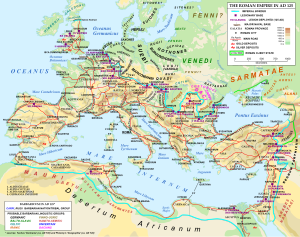Chauci

The Chauci were a populous Germanic tribe that inhabited the extreme northwestern shore of Germany between Frisia in the west and the Elbe estuary in the east. Their name derives from Proto-Germanic *xabukaz, "hawk" (German: Habicht).
The Chauci, like the Frisii, inhabited terpen, artificial mounds raised above the large floodplains of their region, which served to protect their farms from the floods of the North Sea. Their way of life was unfamiliar to the Romans, who found it mystifying. A lively, first hand account is delivered by Pliny the Elder, who writes that the Chauci lived by fishing and hunting. Archeological evidence, however, shows that Pliny isn't quite accurate, since the Chauci also raised cattle and supported cavalry-troops.
The Chauci, according to Tacitus, were highly respected among Germanic tribes. He also describes them as peaceful, calm, and levelheaded, despite the reports in the Annales of piracy.
History
The political position of the Chauci, early in the 1st century, was essentially a pro-Roman one. They provided, for instance, auxiliaries during the second campaign of Germanicus against the Cherusci. The evidence for this is not just the description of Tacitus, but also finds of typical equestrian paraphernalia near the Praetorium on the Kops-plateau near Oppidum Batavorum (Nijmegen), which served as the Roman headquarters in Germania Inferior.
The first known map of Ireland, made by the Greek geographer Ptolemy shows that the Chauci had colonized the eastern part of Ireland during the first or second century AD. [citation needed]
In 47 the Chauci, with the Frisii raided Germania Inferior, led by Gannascus, a Canninefat and deserter from the legions. They used small boats to raid the coast of Gaul (Belgica) but were defeated by Gnaeus Domitius Corbulo. Corbulo in turn started plotting against Gannascus, who was ultimately killed. This however, led to great unrest amongst the Chauci and the situation was about to escalate when Corbulo was ordered by Claudius to retreat behind the Rhine River, which was subsequently declared the border of the Roman Empire.
During the Batavian Rebellion in 69, detachments of Frisii and Chauci fought on the side of Julius Civilis.
By the end of the 3rd century CE, they had merged with the Saxons. Whether this conjunction was amicable or forced is not clear.
The Chauci also appear in the poem Beowulf as "Hugas" where they form a lieger together with the Frankish Chattuarii (Hetwaras) and the Frisians to fight against a Geatish raiding force. The Geats are defeated and their king Hygelac is killed, Beowulf alone escaping.
Bibliography
P. Cornelius Tacitus, de situ et origine germanorum. XXXV.
P. Cornelius Tacitus, annales, XI 18-19, XIII 55.
P. Cornelius Tacitus, historiae IV 79, V 19.
Gaius Plinius Secundus, Naturalis Historia, XVI, 2-4.
This article incorporates some information taken from http://www.hostkingdom.net/ with permission.
